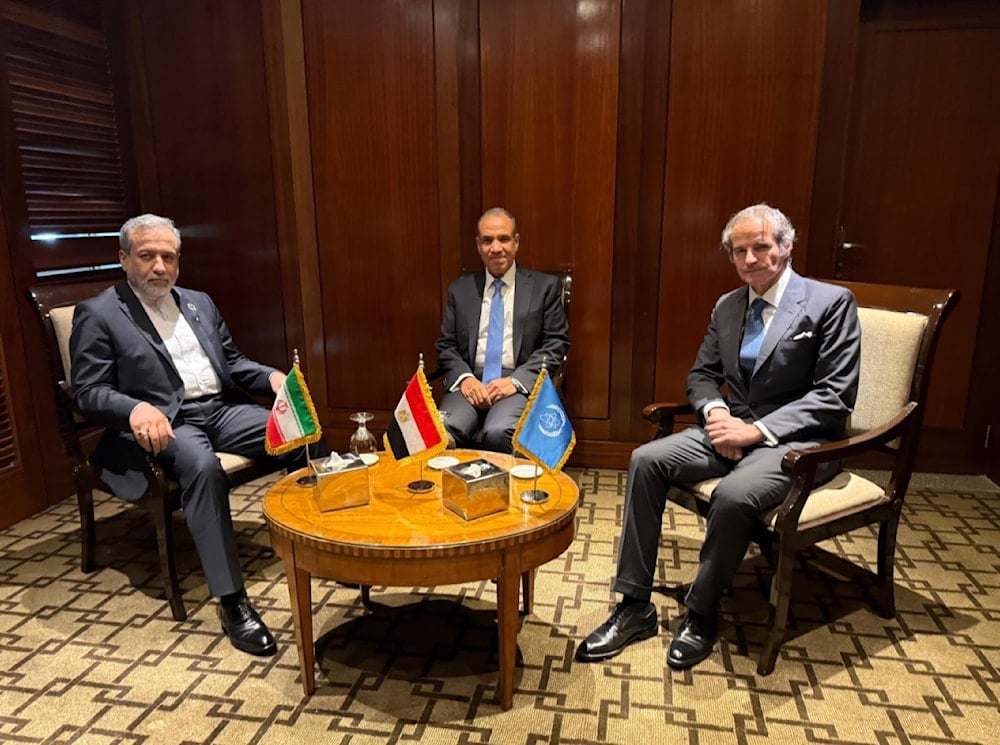Egypt urges 'Israel' to join NPT, citing regional nuclear imbalance
Egyptian foreign minister calls for "Israel’s" inclusion in the Nuclear Non-Proliferation Treaty, highlighting the regional imbalance in arms control and the need for full transparency to foster Middle East stability.
-

Egyptian Foreign Minister Badr Abdelatty meets with International Atomic Energy Agency (IAEA) Director General Rafael Grossi and Iranian President Abbas Arraghchi during a meeting in Cairo, Egypt. (@rafaelmgrossi)
Egyptian Foreign Minis ter Badr Abdelatty on Monday renewed calls for "Israel" to join the Nuclear Non-Proliferation Treaty (NPT), highlighting what he described as a structural imbalance in regional arms control that continues to fuel instability in the Middle East.
During a meeting in Cairo with International Atomic Energy Agency (IAEA) Director General Rafael Grossi, Abdelatty underscored that "Israel remains the only party in the region that has not joined the NPT and refuses to place all its nuclear facilities under the agency's safeguards."
This, he warned, undermines regional trust and reinforces the perception of double standards in the global non-proliferation regime.
The Israeli entity is widely believed to possess a significant undeclared nuclear arsenal, estimated at 80 to 90 warheads, but has consistently refused to confirm its capabilities or subject its facilities to international inspection.
Unlike Iran, which faces continuous IAEA monitoring and pressure to scale back its civilian nuclear program, "Israel" remains exempt from both scrutiny and accountability.
Nuclear imbalance
Abdelatty added that "the current treaty imbalance regarding state commitments under the non-proliferation framework in the Middle East exacerbates regional instability."
His remarks echoed long-standing Arab concerns that Western powers' selective enforcement of non-proliferation norms, particularly shielding "Israel" from oversight, obstructs efforts to establish a nuclear-weapons-free zone in the region, a proposal originally championed by Iran and Egypt.
The minister reaffirmed Egypt's peaceful nuclear intentions, pointing to the Dabaa nuclear power plant project as a key pillar of national development. "This project will open broader prospects for Egypt in its path toward comprehensive development," he said.
Abdelatty also expressed hope that Grossi would actively implement the annual IAEA General Conference resolution on safeguards in the Middle East, which urges all regional states, implicitly including "Israel", to submit to full transparency and verification regimes.
Selective scrutiny
In a statement, Egyptian Foreign Ministry spokesperson Tamim Khalaf praised the IAEA's "vital role in supporting regional security and stability by promoting non-proliferation principles and expanding the peaceful uses of nuclear technology to advance sustainable development goals."
As talks between Iran and the United States resume with mediation from Oman, Tehran has pointed to the West’s selective enforcement of non-proliferation rules as a major obstacle to trust-building.
While Iran is pressured to halt enrichment and dismantle its facilities, no comparable demands are placed on "Israel," whose arsenal remains unacknowledged and unmonitored.
Read more: Iran reasserts right to enrich uranium as talks face new hurdles
New deal
Earlier today, the Trump administration has submitted a fresh nuclear proposal to Iran that would, under tight restrictions, permit limited uranium enrichment on Iranian territory, according to a report by Axios.
The proposal, delivered Saturday by US special envoy Steven Witkoff, outlines a framework that would allow Iran to enrich uranium at low levels, for a duration to be determined during negotiations.
However, the draft imposes significant conditions: Iran would be banned from building any new enrichment sites, required to dismantle key infrastructure used for uranium processing and conversion, and compelled to cease all new research into centrifuge development.
Additionally, Iran would need to scale back enrichment activities to just 3% concentration and shut down underground enrichment facilities.
Sanctions relief would only be granted after Tehran "demonstrates real commitment" to the terms, satisfying both Washington and the International Atomic Energy Agency (IAEA), according to the report.

 4 Min Read
4 Min Read









